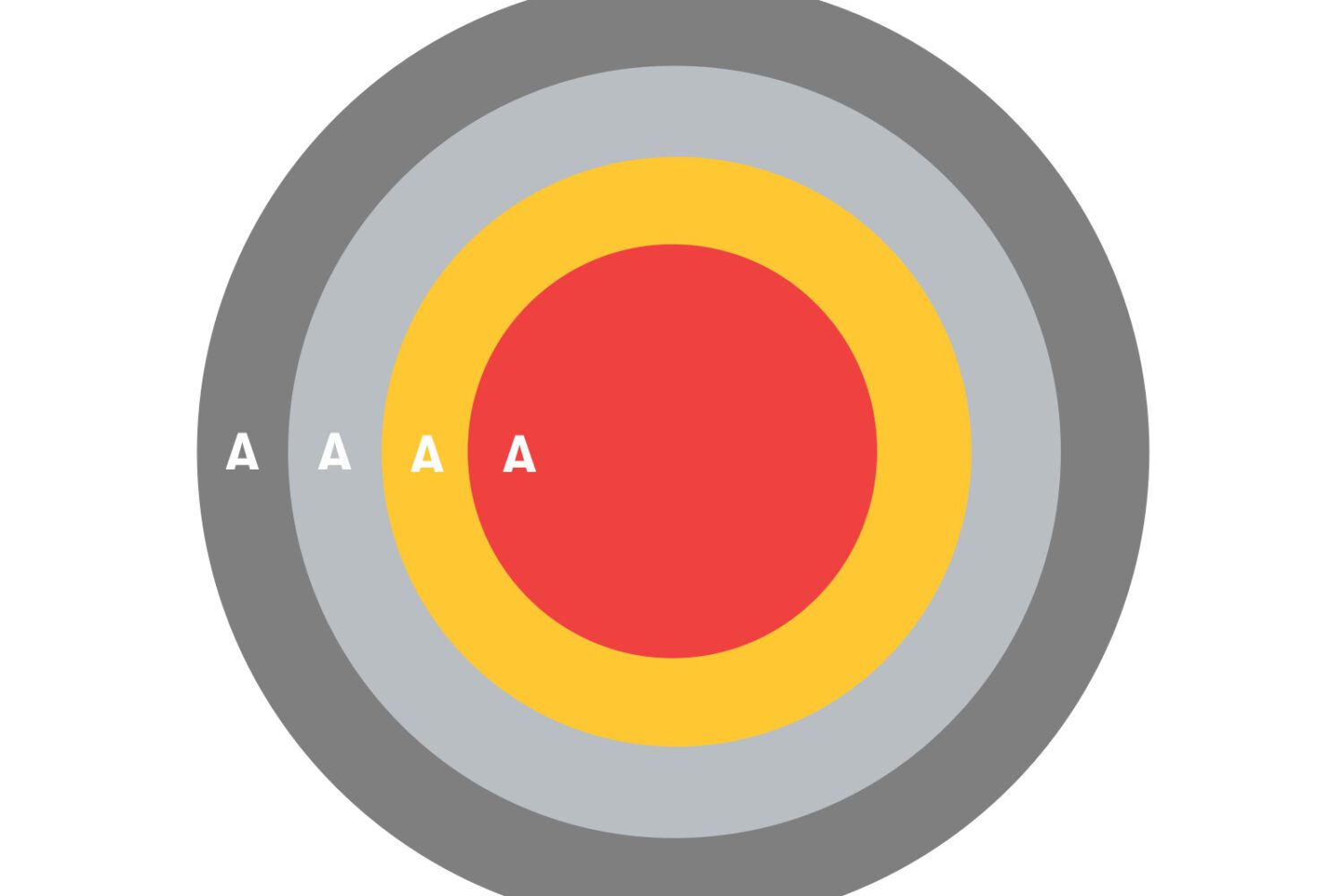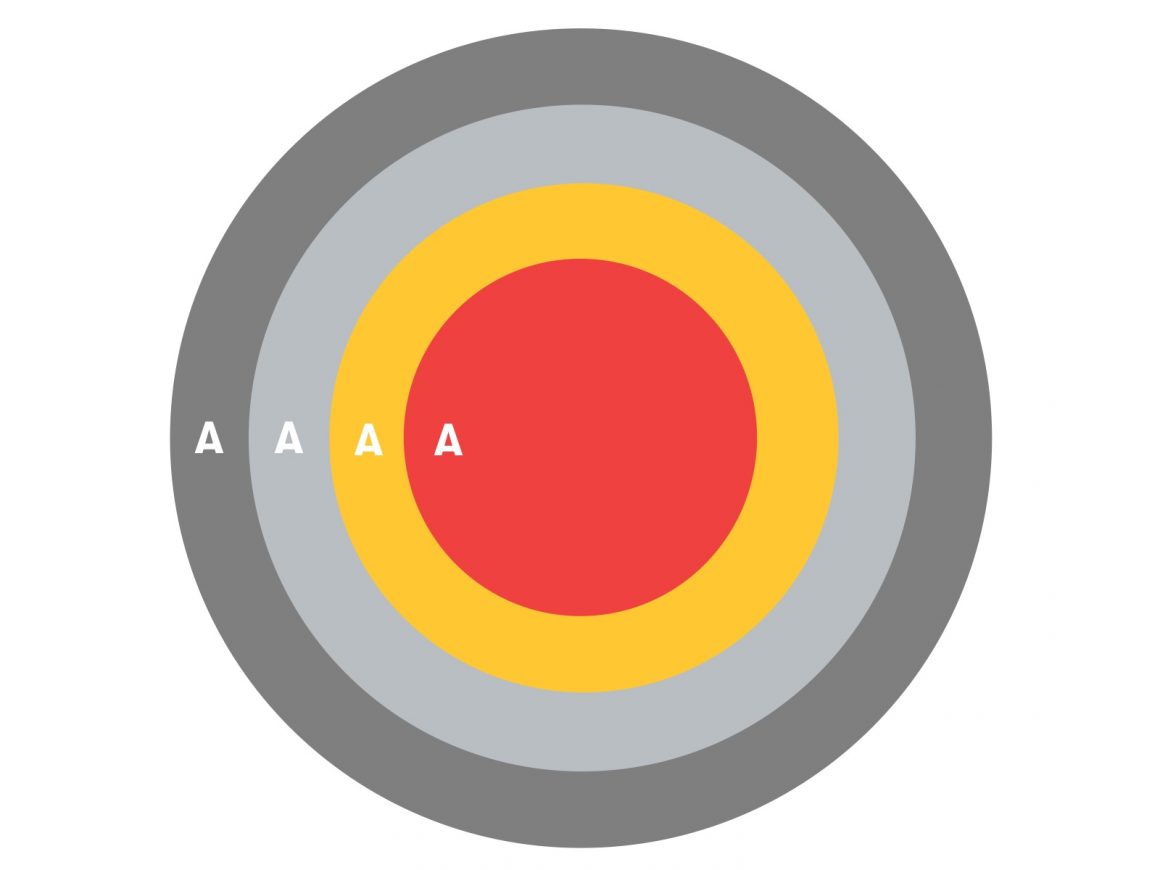Why do we speak in abstract terms (like this one) all the time? Why do we, voluntarily, refuse to be concrete, specific, sharp? I have no answer to this question, but I do know that you can do much better. You can do so much better than the gray mass of generic blah-blah generators.
In the end, it all comes down to one hybrid question: Do you want your words to be understood by others and do you want your words to be remembered by others? If so, make your communication more meaningful.
Inspired by the teachings of Prof. Conor Neill from IESE Business School, here is a visual approach to making your communication more meaningful. In the following FOUR CIRCLES OF MEANING the level of understanding and remembrance substantially increases from the periphery to the center. Why do I know it? 8,164 speech evaluations can hardly lie.
The dark gray circle: A like ABSTRACTION
Value creation, win-win, optimization, cost reduction, goals, critical mass, key performance indicator, synergies, value chain, team spirit, agile, … Image brochure crap! Saying nothing would be more meaningful. At least, you would save the time to do more meaningful things. Abstraction, generic talk, neither helps to be understood nor to be remembered. Throw all abstraction over board. It is a catastrophic waste of time.
The light gray circle: A like ANALYSIS
Better. Now, at least, you add some depth to your superficiality.
We had the goal this year to capture 10 new clients. We accomplished eight new customers; this means we are talking about a success rate of 80%.
Our partner Mutual Media Ltd has generated leads for us that resulted in sales of 560,000 euros. We, on the other hand, hooked them up with a strategic investor who backed up their expansion plans for the next five years. I think we can call this a win-win situation.
The yellow circle: A like ANALOGY
Much better. Now you are comparing one thing with another. Metaphors and similes make concepts more tangible and more emotional, hence more understandable and more memorable.
Our customer acquisition process is like playing golf. First we hit it hard with costly Facebook marketing campaigns. Often we end up somewhere unplanned. From there we have to choose the right iron to get closer to the deal. But, as it happens more than once, just when we are about to get to the green, we end up in the bunker: Legal issues, negotiation, frustration. But – based on skills and the right tools, we can make it on the green. There, we need a good understanding of the situation; we need feeling; we need empathy. And then, with the right soft stroke the ball lands in the hole – the ink of the signature is finally dry.
The red circle: A like ANECDOTE
The best! Instead of generically boasting that you are good at sales, say,
Three months ago, I travelled to Berlin to have a meeting with a prospect, Mr. Scargetter. It was rainy; it was cold; it was a difficult meeting. Mr. Scargetter must have his last name for a reason. He is a tough negotiator. At one point of the meeting he said: ‘You know, I’ve been in this business for 23 years. What you are offering is almost an insult to your clients.’ I said nothing, frowned and paused. After a long uncomfortable pause I responded. ‘Dear Mr. Scargetter, what you call an insult is our tense agenda. But since I can see that you are insisting on a lower value, I know an excellent provider who can work for you on the level you have in mind.’ One month later, we started to work for Mr. Scargetter. I learned a big lesson in this sales process: Be creatively assertive.
In the future I will continue to investigate on the phenomenon of abstraction. In the meantime I suggest that you focus much more on the yellow and red circles. You can throw all your analysis into the red circle. Like the 1995 World Champion of Public Speaking Mark Brown says: Don’t look for the numbers; look for the stories behind the numbers.
Thanks to more meaning, finally, someone will understand and remember much better what you said.



Conor Neill
Thanks for sharing! If we can get less abstraction and more analogies and anecdotes, we are climbing towards the mountain top (with no peak)